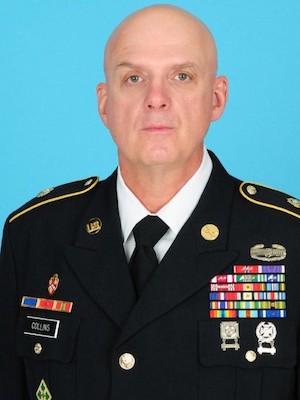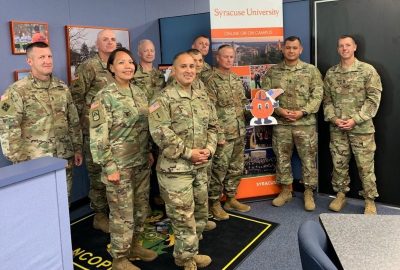After 28 years of decorated military service—including cavalry and artillery assignments in Germany, Bosnia, and Iraq—Sergeant Major Craig Collins G’20, G’22 has begun to mull his next career move. In his own words, his Syracuse University School of Education master’s degree in Instructional Design, Development, and Evaluation (IDDE) and Certificate of Advanced Study in Designing Digital Instruction give him “unlimited options.”
 Whether Collins will continue as an instructor at the US Army Sergeants Major (SGM) Academy, become a leadership development consultant, or even an individual leadership coach, Collins praises the “flexibility” of the IDDE program: “I feel confident that with my Syracuse degree I could go to any company with a leadership program and make positive contributions almost immediately. The sky really is the limit.”
Whether Collins will continue as an instructor at the US Army Sergeants Major (SGM) Academy, become a leadership development consultant, or even an individual leadership coach, Collins praises the “flexibility” of the IDDE program: “I feel confident that with my Syracuse degree I could go to any company with a leadership program and make positive contributions almost immediately. The sky really is the limit.”
The SGM Academy is part of the NCO Leadership Center of Excellence (NCOLCOE), located at Fort Bliss in El Paso, TX. The academy’s fruitful relationship with the IDDE program began in 2019 when its sergeants major were offered the opportunity to complete an instructional design master’s degree fully online. Syracuse was selected as an educational partner for this Fellowship Program because of the high quality of the IDDE master’s program and because of support from SU’s Institute for Veterans and Military Families, the Office of Veteran and Military Affairs, and the Center for Online and Digital Learning at the College of Professional Studies.
Collins was among the first cohort of fellows, graduating in 2020. He is now a credentialed member of the NCOCOE Directorate of Curriculum Development.
“IDDE taught me flexibility and a flexible attitude. The principles I learned can easily be adapted to the current environment. The IDDE program could be adapted to almost any field.”
“I assist in the design, development, and analysis of curriculum for our Noncommissioned Officer Professional Military Education (NCOPME) courses, which are used by all three Army components—active duty, reserve, and National Guard,” explains Collins. “Our mission ensures that every soldier receives common core competencies, which are derived at through the analysis process and then approved by the NCOLCOE Commandant.”
Fascinating Assignment
To Collins, teaching servicemembers leadership skills is a “fascinating assignment.” Among the NCOPME courses he helps to oversee are the Basic Leader Course, which prepares specialists and corporals for the duties and responsibilities of a sergeant; the Master Leader Course, helping sergeants first class become master sergeants; and the Battle Staff Course, which educates staff through master sergeants to serve on battalion and higher-level staff positions.
Collins says the mission the Army expects of his directorate and the skills the 30-credit IDDE master’s program fosters are much the same: to design, create, implement, and evaluate instructional solutions for a variety of educational and professional settings. “What IDDE does and what the Army does are very complimentary.”

The adaptability of this skill set is one of the IDDE program’s key strengths, says Collins, especially useful when applied to the SGM Academy and its varied courses. “IDDE taught me flexibility and a flexible attitude. The principles I learned can easily be adapted to the current environment.” In fact, he adds, “The IDDE program could be adapted to almost any field.”
Another of the IDDE program’s strengths is the analytical approach it teaches its students, also an advantage when it comes to educating servicemembers. “IDDE has helped me to analyze the concepts and required results of a project and then develop courses to achieve that outcome,” Collins explains. “If you don’t understand what the problem is, you won’t be able to provide a solution.”
In particular, when developing or reviewing a course, Collins says he must first analyze, “What soldiers need to know, what they are able to do, and how they feel about that knowledge. This aligns with knowledge, skills, and attitudes which are the bedrock concepts common to all instructional design.”
Lifelong Learner
That last point—that Collins takes into account a soldier’s attitude about what he or she must know—might seem out of place in a learning and work environment where orders are the norm. On the contrary, says Collins, in the Army just as everywhere else understanding your student is at the heart of teaching.
“Someone might not say out loud that they don’t like something, but they might act in a way that is inconsistent with a mission’s accomplishment,” Collins explains. “You have to observe learners. Learning is all about a measurable change in behavior.” In the military, he certainly can give information—and as an experienced soldier, he is used to giving and following orders—”but really to get someone to do what I want, I have to influence them.”
Ultimately, Collins says that’s what instructional design is all about: “sharing information toward creating knowledge.”
And Collins practices what he preaches. One of his tasks as an IDDE student was to create an online blog. It’s something he continues to this day because Collins is a decorated soldier, expert teacher—and a lifelong learner.
His blog is where you can discover what he has discovered about his many passions: Cheap Trick (“The most underrated band ever!”); baseball; Star Trek (“Let me address a current internet ‘hot’ topic, the Quentin Tarantino remake rumor”); the Old West; and some of his favorite places in Europe: Prague, Venice, and Bavaria.
Learn more about School of Education doctoral programs and certificates of advanced study, including instructional design programs.
